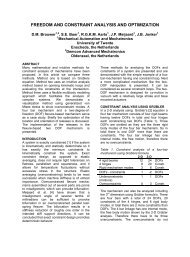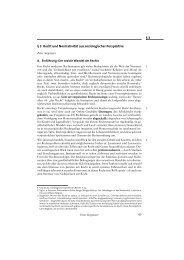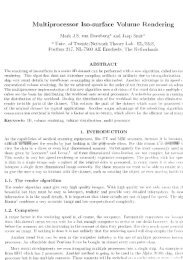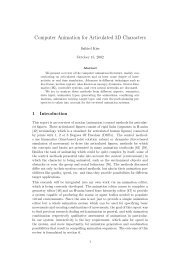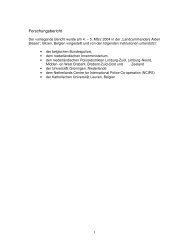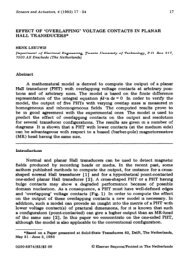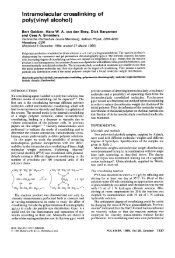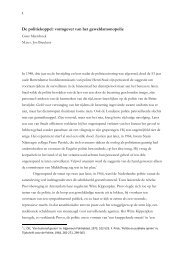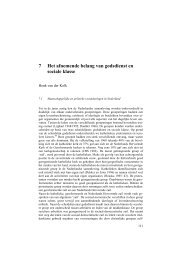- Page 2 and 3:
INNOVATION AND INSTITUTIONAL CHANGE
- Page 4 and 5:
In de reeks Schone Technologie en M
- Page 6 and 7:
Contents Preface v Chapter 1 Transi
- Page 8:
Contents iii 6.4 Liberalisation of
- Page 11 and 12:
vi Chapter This dissertation was fa
- Page 13 and 14:
2 Chapter 1 systems of production a
- Page 15 and 16:
4 Chapter 1 1995: 25). A basic tene
- Page 17 and 18:
6 Chapter 1 and be a member of natu
- Page 19 and 20:
8 Chapter 1 specific momentum for p
- Page 21 and 22:
10 Chapter 1 Chapter eight summaris
- Page 23 and 24:
12 Chapter 2 derive some general pr
- Page 25 and 26: 14 Chapter 2 emerges because of cha
- Page 27 and 28: 16 Chapter 2 ways things were done
- Page 29 and 30: 18 Chapter 2 multinational producer
- Page 31 and 32: 20 Chapter 2 increasing scale and r
- Page 33 and 34: 22 Chapter 2 of alternative views o
- Page 35 and 36: 24 Chapter 2 exchange of knowledge
- Page 37 and 38: 26 Chapter 2 multidirectional flux
- Page 39 and 40: 28 Chapter 2 systems are located at
- Page 41 and 42: 30 Chapter 2 - Misadaptation betwee
- Page 43 and 44: 32 Chapter 2 of these concepts and
- Page 45 and 46: 34 Chapter 2 New institutionalism i
- Page 47 and 48: 36 Chapter 2 production and consump
- Page 49 and 50: 38 Chapter 2 Figure 2.3 Model of an
- Page 51 and 52: 40 Chapter 2 traditional forms of d
- Page 53 and 54: 42 Chapter 2 2.4 Integrating insigh
- Page 55 and 56: 44 Chapter 2 2.4.1 Innovation as a
- Page 57 and 58: 46 Chapter 2 composition of the net
- Page 59 and 60: 48 Chapter 2 its diffusion, to crea
- Page 61 and 62: 50 Chapter 2 materials, and the pro
- Page 63 and 64: 52 Chapter 2 - specificity: as an e
- Page 65 and 66: 54 Chapter 2 often represents the p
- Page 67 and 68: 56 Chapter 2 that the introduction
- Page 69 and 70: 58 Chapter 2 2.5 Concluding remark
- Page 71 and 72: 60 Chapter 3 society. A further sec
- Page 73 and 74: 62 Chapter 3 perceptions and soluti
- Page 75: 64 Chapter 3 Linkages involve conne
- Page 79 and 80: 68 Chapter 3 185). Institutional lo
- Page 81 and 82: 70 Chapter 3 invested (Hughes, 1983
- Page 83 and 84: 72 Chapter 3 analysts of, the elect
- Page 85 and 86: 74 Chapter 4 energy saving and effi
- Page 87 and 88: 76 Chapter 4 In their analysis of t
- Page 89 and 90: 78 Chapter 4 Hughes’ basic model
- Page 91 and 92: 80 Chapter 4 improving the system a
- Page 93 and 94: 82 Chapter 4 Figure 4.3 Technology
- Page 95 and 96: 84 Chapter 4 by pollution, problems
- Page 97 and 98: 86 Chapter 4 4.5 The development of
- Page 99 and 100: 88 Chapter 4 energy sources. Safegu
- Page 101 and 102: 90 Chapter 4 - Application of nucle
- Page 103 and 104: 92 Chapter 4 - The government and t
- Page 105 and 106: 94 Chapter 4 military-industrial co
- Page 107 and 108: 96 Chapter 4 hardware” (Hirsh, 19
- Page 109 and 110: 98 Chapter 4 In conclusion, the int
- Page 111 and 112: 100 Chapter 4 government 25 . Never
- Page 113 and 114: 102 Chapter 4 - Both economic incen
- Page 115 and 116: 104 Chapter 4 organisation of the e
- Page 117 and 118: 106 Chapter 4 industry could delive
- Page 119 and 120: 108 Chapter 4 More robust plans for
- Page 121 and 122: 110 Chapter 4 Table 4.4 Evolution o
- Page 123 and 124: 112 Chapter 4 4.11 The development
- Page 125 and 126: 114 Chapter 4 Table 4.6 Evolution o
- Page 127 and 128:
116 Chapter 4 Parties involved are
- Page 129 and 130:
118 Chapter 4 Figure 4.5 Conversion
- Page 131 and 132:
120 Chapter 4 combustion of biomass
- Page 133 and 134:
122 Chapter 4 The focus on biomass
- Page 135 and 136:
124 Chapter 4 Let us consider other
- Page 137 and 138:
126 Chapter 4 varying processes of
- Page 139 and 140:
128 Chapter 5 technological and ins
- Page 141 and 142:
130 Chapter 5 Figure 5.3: Share of
- Page 143 and 144:
132 Chapter 5 and search routines i
- Page 145 and 146:
134 Chapter 5 solutions is main con
- Page 147 and 148:
136 Chapter 5 and was triggered by
- Page 149 and 150:
138 Chapter 5 signalling significan
- Page 151 and 152:
140 Chapter 5 Table 5.2 Main change
- Page 153 and 154:
142 Chapter 5 1982; Blok, 1991; Bui
- Page 155 and 156:
144 Chapter 5 10-12). The third iss
- Page 157 and 158:
146 Chapter 5 replaced the focus on
- Page 159 and 160:
148 Chapter 5 from 220 MWe in 1990
- Page 161 and 162:
150 Chapter 5 and supply. Only afte
- Page 163 and 164:
152 Chapter 5 provides an overview
- Page 165 and 166:
154 Chapter 5 Prospects for cogener
- Page 167 and 168:
156 Chapter 5 the existing system a
- Page 169 and 170:
158 Chapter 5 add, not a sufficient
- Page 171 and 172:
160 Chapter 5
- Page 173 and 174:
162 Chapter 6 signify a process of
- Page 175 and 176:
164 Chapter 6 a liberalised market.
- Page 177 and 178:
166 Chapter 6 were allowed to produ
- Page 179 and 180:
168 Chapter 6 in the municipality o
- Page 181 and 182:
170 Chapter 6 became in turn one of
- Page 183 and 184:
172 Chapter 6 Table 6.1 Milestones
- Page 185 and 186:
174 Chapter 6 6.4 Liberalisation of
- Page 187 and 188:
176 Chapter 6 After the opening of
- Page 189 and 190:
178 Chapter 6 Renewable Energy Cert
- Page 191 and 192:
180 Chapter 6 2001b). The company w
- Page 193 and 194:
182 Chapter 6 infancy, energy compa
- Page 195 and 196:
184 Chapter 6 What is striking that
- Page 197 and 198:
186 Chapter 6
- Page 199 and 200:
188 Chapter 7 meaning, infrastructu
- Page 201 and 202:
190 Chapter 7 Figure 7.2 Social gro
- Page 203 and 204:
192 Chapter 7 Figure 7.3 A dynamic
- Page 205 and 206:
194 Chapter 7 7.3 Strengths and wea
- Page 207 and 208:
196 Chapter 7 Table 7.3 shows that
- Page 209 and 210:
198 Chapter 7 The process of libera
- Page 211 and 212:
200 Chapter 7 towards resource inde
- Page 213 and 214:
202 Chapter 7 improvement of cable
- Page 215 and 216:
204 Chapter 7 project. The high ene
- Page 217 and 218:
206 Chapter 7 of the promising nich
- Page 219 and 220:
208 Chapter 7
- Page 221 and 222:
210 Chapter 8 gain stability as a c
- Page 223 and 224:
212 Chapter 8 with the application
- Page 225 and 226:
214 Chapter 8 Table 8.2 Institution
- Page 227 and 228:
216 Chapter 8 growth rates of insta
- Page 229 and 230:
218 Chapter 8 This involved changes
- Page 231 and 232:
220 Chapter 8 contributes to a bett
- Page 233 and 234:
222 Chapter 8 decisions and rates o
- Page 235 and 236:
224 Chapter 8 The applicability of
- Page 237 and 238:
226 Chapter 8 8.5 Lessons for trans
- Page 239 and 240:
228 Chapter 8 ideas. Moreover, the
- Page 241 and 242:
230 Chapter 8 and decentral cogener
- Page 243 and 244:
232 Chapter 8
- Page 245 and 246:
234 References Arentsen, M.J., and
- Page 247 and 248:
236 References Bressers, H.Th.A. an
- Page 249 and 250:
238 References De Jong, J.J., E. We
- Page 251 and 252:
240 References EPRI (1999) Electric
- Page 253 and 254:
242 References Geels, F.W. (2002b)
- Page 255 and 256:
244 References Henderson, R.M. and
- Page 257 and 258:
246 References Islas, J. (1999) The
- Page 259 and 260:
248 References Dependence and Creat
- Page 261 and 262:
250 References Nelson, R.R. (1995a)
- Page 263 and 264:
252 References Quarles van Ufford,
- Page 265 and 266:
254 References Schmidheiny S. (1992
- Page 267 and 268:
256 References SNM (2000) Frisse Wi
- Page 269 and 270:
258 References Van de Ven, A.H. and
- Page 271 and 272:
260 References VROM (1993) National
- Page 273 and 274:
262 References
- Page 275 and 276:
264 Samenvatting analytisch kader d
- Page 277 and 278:
266 Samenvatting maar toch een grot
- Page 279 and 280:
268 Samenvatting
- Page 281:
270



